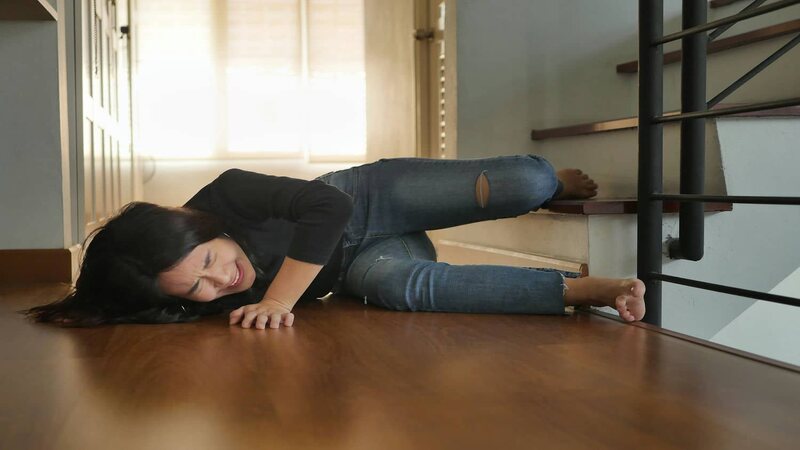
Slipping during pregnancy is the one thing pregnant women must be most cautious of and are pretty much scared of. However, an accidental fall during pregnancy can be both alarming and dangerous and is not uncommon.
Studies in this field have shown that around 27% of women misstep at least once during their pregnancy (1). 10% of women fall more than once during their pregnancy period. Another annoying fact is that 29% of trauma in pregnancy is caused due to falling or slipping. In this article, we’ll discuss some insights on slipping during pregnancy and how it can be prevented.
Slipping or Falling During Pregnancy – Common Misconceptions
There are several misinterpretations about falling during pregnancy. Some of the false notions that you should ignore are:
- Most of the falls lead to miscarriage.
- Fractures may occur in the unborn baby.
- The baby’s brain can be affected.
- The uterus and fallopian tube of the mother get irreversibly damaged.
What are the Reasons for Falling Down During Pregnancy?
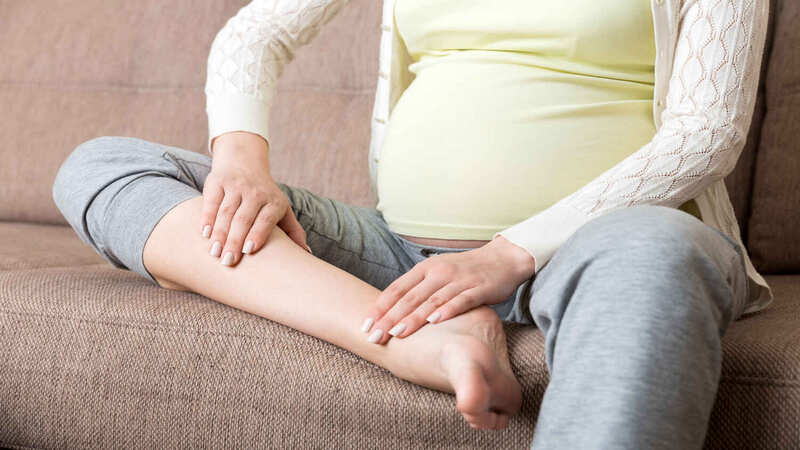
The likelihood of falling increases as the pregnancy progresses. Some of the reasons that increase the chances of falling during pregnancy are:
- Shifting of the center of gravity due to the growing bump makes it difficult to balance the body, especially on uneven surfaces [2].
- Increased weight in the middle part of the body.
- Pregnancy hormones help to relax the joints and ligaments, which helps tissues in the pelvis and cervix to stretch during delivery, however, losing the joints makes you easily off-balance.
- Low blood pressure and low blood sugar, which are common during pregnancy, make women feel dizzy and lose balance.
- Swelling of the feet can make the steps clumsy.
[Read : Clumsiness During Pregnancy]
What to Do if You Fall During Pregnancy
Fortunately, the uterus is strong enough to protect the fetus from shock or sudden jerks. However, the chances of risk increase in the second and third trimesters, especially if the fall is intense. This could leak the amniotic fluid, break the placenta, or cause contractions. Talk to your healthcare provider and explain the symptoms if the fall occurs in the first trimester.
Further, if it occurs in the late phase or after 23 weeks, seek medical help immediately. Falls during pregnancy may cause bone fractures, head injuries, internal bleeding, and shifting of the baby’s position. Your doctor can do special tests to make sure everything is fine. Further, you may go through postural stability tests to check if there’s a risk of falling due to postural instability.
Can Falling During Pregnancy Harm the Baby?
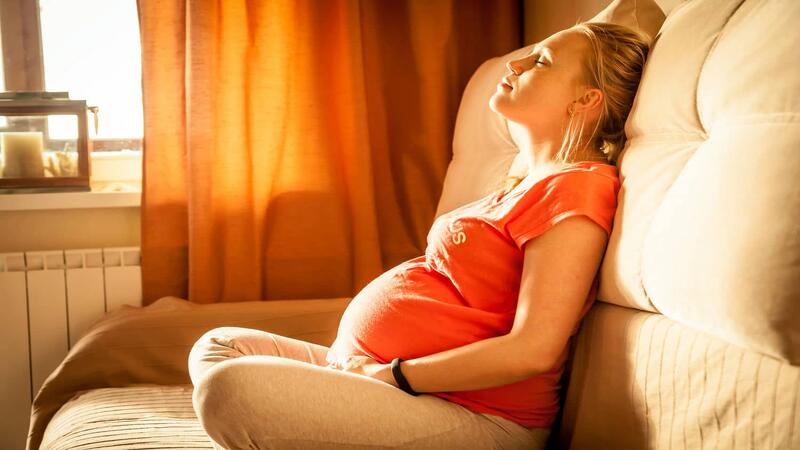
If you are not hurt badly due to the fall, the chances are less for your baby to get hurt. This is because the fetus is well protected with:
- The amniotic fluid which acts as a cushion
- Amniotic sac
- Thick and masculine wall of the uterus
- Abdominal fat
- Abdominal muscles
- Pelvic bone
Hence, for small accidents involving slips and falls, the baby may stay safe. . But, if the injury is severe enough to seriously hurt you, then the baby can also get affected directly or indirectly. In any case, it’s better to visit a doctor to avoid complications.
What Determines the Level of Danger of Falling During Pregnancy?
Although slipping and minor falls are common during pregnancy, they may be risky. The impact of falling during pregnancy is determined by mainly three factors:
- Age of the Pregnant Woman: The older the pregnant woman the chances of complication increase. Immediate medical attention should be given even though she shows no alarming symptoms
- Pregnancy Stage: At which stage of pregnancy the fall occurs is an important factor that determines the impact. The risk factor increases with the later trimesters [3].
- Position of Fall: It is too dangerous to fall flat on the stomach other than falling on the back or side
What is the Impact of Falling Down in the First Trimester of Pregnancy?
In early pregnancy, the uterus is tucked in the pelvis and is well protected by the pelvic bones. So during the first trimester falling has less impact on the baby or placenta. If you do have an accident wherein you have slipped, just lie down and relax for some time. But if you are still anxious and develop some abdominal or back pain then visit your doctor. The reassurance from your doctor can make you feel less anxious.
Is it Dangerous When I Fall Down in the Second Trimester of Pregnancy?
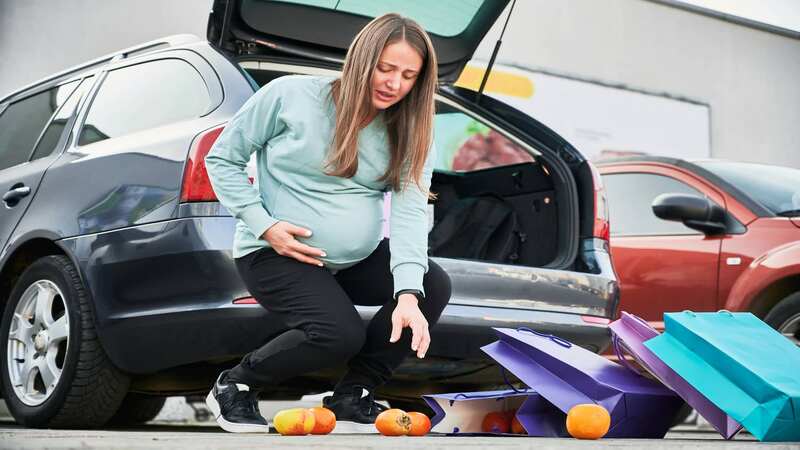
Once you get into your second trimester, the uterus is not tucked in the pelvic bone. But all the other covers of protection are still there to shield the baby from harm.
Relatively some complications can arise when you fall during the second trimester of pregnancy, especially if you fall on your stomach. Seek medical attention if:
- You develop severe pain after the fall
- There is vaginal bleeding or spotting
- You fall on your stomach
- The movement of fetus is decreased
- You feel dizzy or breathlessness
- Start develop uterine contraction
- You develop tenderness in your abdomen
Once you develop some of the above symptoms, you should seek medical attention. Your doctor will examine you and monitor your baby to make sure all is well.
What Happens When I Fall Down on the Third Trimester of Pregnancy?
As the pregnancy progresses, the chances of the fall harming the mother and baby also increase. Moreover, the women are more prone to fall as fatigue and clumsiness increase towards the end of pregnancy.
During your last trimester, you may not be able to avoid the danger due to a fall as easily as in your first trimester. If the fall is severe enough to generate a problem, damage will occur most probably to the placenta [4]. Trauma to the abdomen increases the chances of pulling the placenta away from the uterine wall.
The warning signs include:
- The amniotic fluid starts to leak
- Vaginal bleeding or spotting progressing to bleeding can occur
- The fetal movement may decrease
- Sensations of dizziness or sense of fainting increases
- You might experience shortness of breath
- Cramping or contractions of the uterine wall
- Severe abdominal pain
Premature labor is usually associated with a fall that occurs in the third trimester of pregnancy.
Even if you don’t develop the above symptoms go ahead and consult your practitioner. Your doctor will definitely go for an ultrasound to ensure the safety of you and your baby.
[Read : How Will I Know If I Am Leaking Amniotic Fluid?]
Preventing Accidents of Slipping During Pregnancy
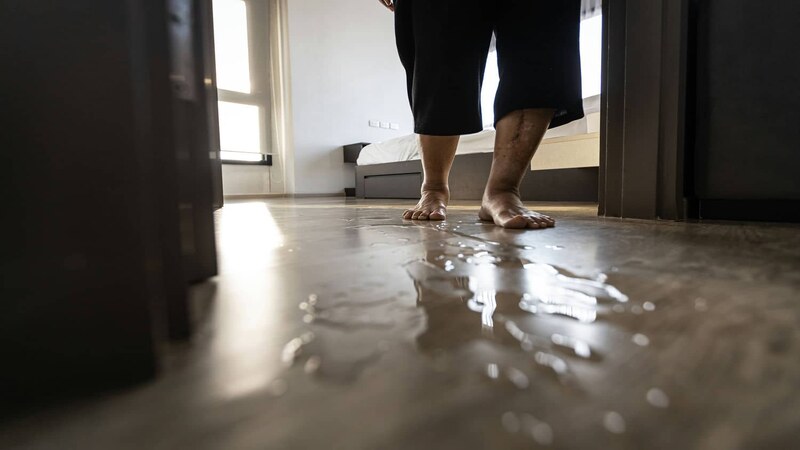
It is important to keep a few precautions in mind to reduce the likelihood of slipping and falling. you can stay away from accidents if proper precautions are taken. These include;
- Most accidents of slipping happen in wet areas, likely in the bathroom and kitchen. Pay more attention when you are taking a bath. Water and soap makes the bathroom floor more slippery. However, you could use wet anti-skid tape and make your bathroom slip-proof. Easy to use and cost-effective, we strongly recommend anti-skid tapes to be used during pregnancy.
- Use flat footwear instead of heels as wearing heels during pregnancy increases the risk of losing balance.
- Select footwear with non-skid soles.
- Steady yourself against something strong or sit down when you start to feel dizzy.
- Be extra careful during the rainy season (or during snowfall).
- Hold tightly on the rails while climbing down or climbing up.
- If there is nothing to support you, don’t be shy about asking for a hand whenever you feel it.
- Put non-slip Bathmats on the door and put non-skid mats inside the shower or tub. This will minimize the risk of falling down.
- Walk slowly while maintaining the balance
- Do not walk on newly washed or waxed floors.
- If you exercise choose ones that are absolutely safe.
Pregnancy Balance Exercises
According to the research, exercising during pregnancy can help improve balance and coordination to minimize the chances of falls. Pregnancy balance exercises build strength and flexibility in the upper and lower limb muscles (5). This allows for performing various movements with ease.
Here are some simple and safe pregnancy balance exercises.
Seated Leg Raise
This exercise strengthens your abdominal muscles and helps with stability (6). Here’s how to do it.
- Sit on a chair comfortably in a neutral position.
- Keep your feet on the floor at a hip-width distance apart.
- Involve your abdominal muscles and raise your right leg, extending your knee.
- Simultaneously raise your left arm and hold the position for a few seconds.
- Repeat the same with the other hand and leg.
Seated Side Stretch
This exercise releases tension from the side of the body and stretches the upper and lower limb muscles. To do this,
- Sit on a chair, pulling your abdominal muscles in.
- Place your right hand on your left knee.
- Raise your left hand and bend it to the right side gently. Make sure you keep the shoulders upright and don’t hunch them.
- Feel the stretch and hold it for a few seconds.
- Do the same on the next side.
Backbend
This stretch targets your upper and lower back muscles (7). It helps balance the forward bending that occurs due to a growing belly. Here are the steps to do it.
- Stand straight on the floor.
- Put your hands on the lower back (at the hip region).
- Bend slowly backward, about 10 to 15 degrees, and hold the stretch for 5 to 10 seconds.
- Ensure your stability and comfort while doing the stretch.
When to See Your Doctor
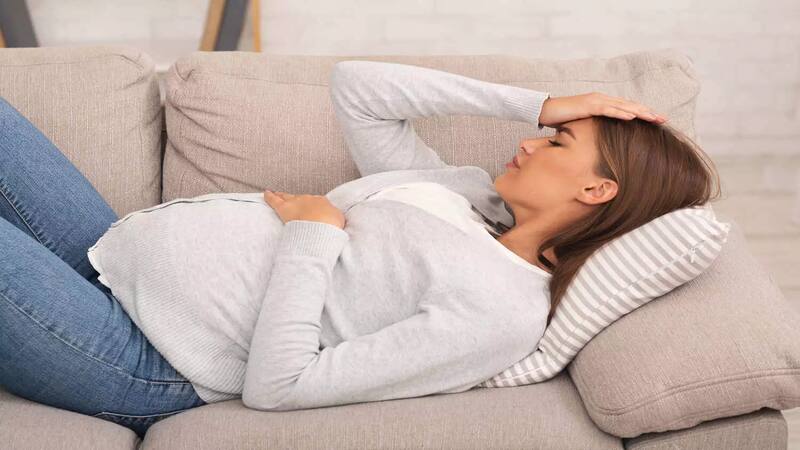
Many times, a minor jerk doesn’t cause a problem. Nevertheless, it’s good to see a doctor to avoid complications. Your doctor may examine you based on the symptoms experienced and do some tests. Here are some symptoms that show when to get medical assistance.
- When you observe a direct blow in the abdominal region, or there’s fluid or blood leaking.
- You feel tenderness and pain around the stomach, uterus, and pelvis.
- If you feel contractions or observe less movement of the baby as normal.
Pregnancy is a crucial stage and requires utmost care and attention. Pregnant women should take care of themselves and reduce the likelihood of slipping during pregnancy. They must seek immediate medical assistance to ensure safety.
Have a safe pregnancy.
[Read : Heels During Pregnancy – Safe Or Not?]
FAQ’s
1. 1. What Do I Do If I Have Sipped And Taken A Fall In My Final Trimester?
Check for any fluid leaks or bleeding. If all is well, check for baby’s kick count for the next hour. If everything seems fine, you are safe; else consult a doctor immediately.
2. Can Falling On my Back While Pregnant, Hurt my Baby?
It may not. The baby is well cushioned in the womb with amniotic fluid. However, falling on your back can hurt your spine and affect your balance when you walk next.
3. How to Help a Pregnant Woman Who has Slipped and Taken a Fall?
First, ask her if they can be lifted. Once she agrees, hold them by both hands and lift them up with some support to their back as well. Let her relax and analyze for any fluid leaks or bleeds. Take her to her doctor if needed.
4. Can Falling Down in my First Trimester Cause an Abortion?
It can, depending on your fall. If you had a bad fall directly on your stomach, it can increase the chances of abortion. In most cases, your baby will be safe as the baby is still very tiny.
5. How do I Know if my Baby is Ok After A Fall?
It is important to be vigilant about the symptoms after a fall. If you fall during your first trimester, contact your doctor without hesitation. If the fall happens during the second or the third trimester, you must be watchful of vaginal bleeding and baby kicks. However mild the fall is, it is always better to keep your doctor in the loop about your daily incidents.
6. Can Slipping Cause Miscarriage?
No, slipping does not always cause a miscarriage. Because, the baby is safe inside the amniotic sac, which protects them like a barrier. However, it is always better to talk to your doctor, as they will help you ensure the safety of your baby during such mishaps.
References
1. Risk factors for accidental falls during pregnancy – a systematic literature review
https://www.tandfonline.com/doi/full/10.1080/14767058.2021.1935849
2. The Biomechanics of Pregnancy: A Systematic Review
https://www.ncbi.nlm.nih.gov/pmc/articles/PMC7739277/
3. Fall risk management in interventional prenatal diagnosis perioperative pregnant women based on tracking methodology and failure mode and effect analysis application
https://journals.lww.com/md-journal/fulltext/2023/11030
4. Development of an Assessment Scale for the Risk of Falling in Pregnant Women
https://www.ncbi.nlm.nih.gov/pmc/articles/PMC10229038/
5. Physical activity during pregnancy: a systematic review for the assessment of current evidence with future recommendations
https://bmcsportsscimedrehabil.biomedcentral.com/articles/10.1186/s13102-022-00524-z
6. The Effects of Curl-Up and Straight Leg Raising Exercises in Different Hip Joint Positions on Abdominal Muscle Thickness
https://www.sciencedirect.com/science/article/abs/pii/S1556370723000329#
7. Standardized Stretching Postural postures to treat low-back pain in pregnancy: the GEMALODO randomized clinical trial
https://www.sciencedirect.com/science/article/abs/pii/S258993332300229X#

